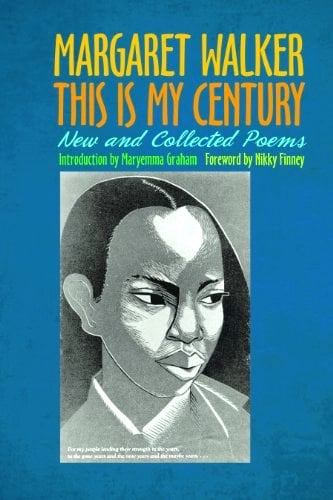Jubilee by Margaret Walker (1966)
By Nava Atlas | On June 15, 2020 | Updated September 2, 2022 | Comments (0)

Jubilee by Margaret Walker (1966), the only novel by this esteemed American author, poet, and educator, was the culmination of some twenty-five years of research and writing.
The story of Vyry, a mixed-race slave, is based on the real-life experiences of Walker’s great-grandmother. Walker received the Houghton Mifflin Literary Fellowship for this book, and its completion served as her Ph.D. from the University of Iowa.
Covering the antebellum years, Civil War, and Reconstruction periods, the narrative moves from a Georgia plantation to Alabama, following Vyry’s life and loves. Jubilee received praised for its realistic depictions of daily life in the time of slavery and its aftermath.
Each of the fifty-eight chapters begins with a proverb or an excerpt from a spiritual. Crispin Y. Campbell, a Washington Post contributor, hailed the work as “the first truly historical Black American novel.”
Indeed, Jubilee has often been called the “Black Gone with the Wind” and more accurately the “anti-Gone with the Wind” for its more realistic (yet still eminently readable) depiction of the old South, minus the romanticized view of slavery.
. . . . . . . . . . .

Learn more about Margaret Walker
. . . . . . . . . . .
A 1966 review of Jubilee by Margaret Walker
From the original review of Jubilee by Margaret Walker in the Albuquerque Journal, Sept. 12, 1966:
“Freedom is a secret word I dare not say.”
This chapter heading from Jubilee by Margaret Walker sums up both Vyry Brown’s story and the the novel itself.
The novel is based on true story of her great-grandmother’s life before, during, and after the Civil War reads like the best of the novels of this period. The desire of Vyry for freedom is so vibrant and so alive, the audience can feel it pulsing from the pages.
Vyry, the daughter of plantation owner John Dutton and a slave, Sis Hetta, takes the reader on a journey through the intimacies of plantation life, the life of a slave, life in the “Big House,” and the secret life of a Black slave who yearned for a close family society and freedom. She risked many beatings for a breath of it.
Vyry did not fight the laws of nature that gave her a life of slavery, nor the laws which forbade her the right to vote, to own property, or to receive and education — nor did she fight the feelings of Southerners who didn’t want the Brown family in their town.
She withstood the pain of freedom without its rights — and won. Vyry finally found a town where people of her race were accepted by its residents. She eventually felt that all her suffering earned her the right to work and pursue happiness.
Aside from being based on the story of a real person, it depicts the antebellum, Civil War and reconstruction periods from an African-American perspective.
How Margaret Walker came to write and publish Jubilee
From the original article in the Mason City, Iowa, Globe-Gazette, July 30, 1966: Jubilee Author is Jubilated
Release of Margaret Walker’s novel, Jubilee, in September by Houghton Mifflin Co. will mark the climax of more than twenty-five years of work.
The novel, which won the 1966 Houghton Mifflin Literary Fellowship Award, was started when Miss Walker was 19 and was finally completed last year while she was a graduate student in the University of Iowa Writer’s Workshop.
Based on the true story of Miss Walker’s great-grandmother, a mixed-race slave named Margaret (Vyry) Duggans Ware Brown, the book is something the author “has lived with most of my life.”
Many of the incidents in the book are based on stories Miss Walker heard when she was a child from her grandmother, who “always expected the story to be written.”
At the time she wrote the first 300 pages, Miss Walker was working on a B.A. degree at Northwestern University and “had no idea how to write a novel. The story was very unformed.”
She put the story aside for a few years until she came to the University in 1939 (?) to work for an M.A. in English.
“I took the uncompleted manuscript with me to Iowa,” she said, “hoping to do some work on it.” The Writers’ Workshop was just beginning then, Miss Walker said.
“I read an article in Life Magazine about the workshop,” she explained. “A number of my friends had attended Iowa and they also encouraged me to go there.”
It probably was some of the best advice friends ever gave, for Miss Walker produced a volume of poetry, For My People, as her Master’s thesis, which won the Yale Series of Younger Poets Award and was published by Yale in 1943.
Miss Walker went to Jackson State College, Mississippi to teach, married Firnist James Alexander, and had four children. She began a ten-year period of research, part of which was financed by a Ford Foundation grant. Another ten years went by before she was able to return to Iowa to work on her Ph.D. and get help in putting the novel together, much of that happening in early 1965.
“A former teacher of mine at Northwestern, Professor Edward Hungerford, had met the senior editor of Houghton Mifflin in Chicago the previous fall and told her about my book. The editor wrote to me at once and when the book was finished, received the manuscript.
Less than a month later, the publishers had accepted the novel and in January of this year, the book won the fellowship.
. . . . . . . . . .

Leave a Reply